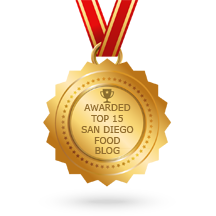Decaf You Can Fall in Love With
It's been decades since I've been able to drink regular coffee. In the years since I first gave it up, the quality of decaf has steadily improved. And yet I can't take for granted that when I go to a meeting or a coffee house, a restaurant or an event that I'll be able to enjoy a cup--delicious or not. In coffee houses, the compromise often is an Americano, which is okay, but not the same as a quality full-bodied decaf.
One local coffee roaster that seems to respect the desire of decaf drinkers to luxuriate in a delicious cup of coffee is Cafe Virtuoso, a 100 percent certified organic roaster that's been in business since 2008. Owners Laurie and Savanah Britton, who run their business out of a sleek warehouse space in Barrio Logan, invited me to come in to learn about their roasting process and taste their decaf varieties.
Daughter Savannah, who manages quality control, explained that they send their roasted beans to Coffee Review for an evaluation (You can see the scores they've received here.) It's a 100-point scale. Their Signature Decaf, mistakenly judged and scored as espresso instead of the intended drip, received a 90, she said. "We don't even look at coffee beans unless they're at least an 84," she added. Coffee Review is correcting the error by rating it again for drip.
She then introduced me to Cafe Virtuoso's head roaster, Nelson Teskey. Teskey, who came to work at Cafe Virtuoso nine months ago from his native British Columbia, began his coffee obsession while in high school and in 2014 became a licensed Q, or Quality, Grader from the Coffee Quality Institute, basically the coffee equivalent of a sommelier. According to Cafe Virtuoso, he's the only Q Grader in San Diego who is also roasting coffee. Teskey is also a Specialty Coffee Association of America (SCAA) Lead Instructor, who teaches others how to roast specialty coffee.
We began with a tasting. Teskey prepared both their Signature Decaf and Decaf Vernazza using a pour over technique. "We like to pour over because it releases more delicate, subtle flavors without the sediment that you get from a French press," he explained. He added that if you use a French press after you pour your cup/s, you should pour the remaining coffee in the press into another carafe or Chemex so that it doesn't overextract from exposure to the grounds at the bottom.
I tasted both coffees black, of course. Teskey, not surprisingly, was keen on explaining the various notes of each variety. My palate isn't as refined. But while I enjoyed both, I appreciated the Signature decaf more sans milk or sugar. There was no residual sourness that I sometimes experience with black coffee and the flavor was rich, almost chocolate-like.
Teskey then showed me their impressive stainless steel Loring roaster. All of the controls on this roaster are digital, enabling them to track the temperature of the beans through the various stages of roasting. If Teskey and the Brittons are happy with the results, they can then digitally save the roasting profile so that in the future they'll get consistent roasted beans for that variety. Before they could digitally control the process, consistency was based on the experience of a single person running the machine and the aromas and tastes that person experienced.
Cafe Virtuoso roasts 10 to 15, 70-pound batches a day--the yield following roasting drops to 57 to 60 pounds since the beans give up moisture in the process. When they get in new beans, Teskey said, they'll do a sample roast based on standards for the profile of that bean variety. Then they'll do a cupping, or tasting, of the results. They'll score the sample based on the cupping, but, as Savannah had said, they won't buy the beans if they rate below an 84. Tesky will consult with her about the flavor notes and their goals for the beans they do decide to keep and will then roast the beans based on that.
For decaf beans, the roasting process is different because the beans have undergone Swiss Water Processing, which removes 8 to 9 percent of the water in the beans before they're even roasted. So, said Tesky, the roasting temperatures are lower than the usual 350 to 460 degrees. It's gentler because the potential of burning the beans is more dramatic.
I bought bags of both decaf varieties with the intent of using the Decaf Vernazza for when I want to make a cappuccino or mocha and the Signature for when I want to keep things small and simple--an easy pour over of a single small cup to enjoy black. It's been a great way to start my mornings.
Cafe Virtuoso is located at 1616 National Ave. You can buy coffee beans there--as well as specialty drinks and snacks at their coffee bar. You can also find their coffee here.
Print Page















No comments:
Post a Comment